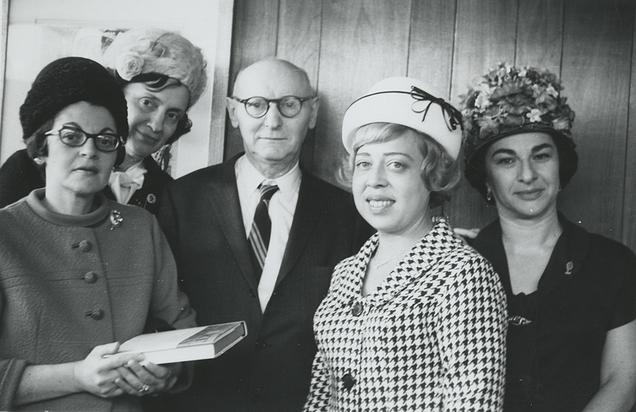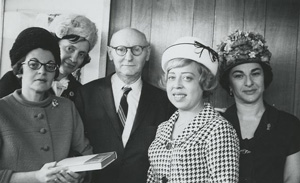Writers have their way with the world until they depart from it, and then they are at the mercy of those who interpret them. This mischievous turnabout would have appealed to Isaac Bashevis Singer (1902-1991), possibly the most prolific and certainly the most famous Yiddish writer of the 20th century, whose reputation is now in the hands of types he once turned into fiction. But if The Muses of Isaac Bashevis Singer, a new documentary movie by the Israeli directors Asaf Galay and Shaul Betser, is any portent, the afterlife of this particular writer may be graced by the same improbable good fortune he enjoyed on earth.
In explaining the genesis of his project, Galay tells us that, as a devoted reader of Singer in Hebrew and English, he was struck by the sheer number of the master’s translators. He counted 48 names before stopping—a figure high enough to tweak his imagination, especially since almost all were women. Among these women are the several “muses” featured in Galay’s movie as talking heads and/or in vintage footage. As it happens, notoriety had long since attached itself to those whom Singer called “his harem,” implying that his lady translators were also at his sexual behest. Interviewing some of these women, Galay found them perfectly ready to embroider the legend, if not to clarify which of the harem’s two parties was at the mercy of the other.
Isaac Singer came to New York from Warsaw in 1936, armed with a freshly published copy of his debut novel, Satan in Goray, but clueless in English and still in the literary shadow of his older brother Israel Joshua, who had sponsored his passage. It was to distinguish himself from the already famous I.J. that Isaac adopted the pen-name Bashevis, after his mother. But sibling rivalry wasn’t the only obstacle in his path. He also suffered from the loss of his natural readership, most of which had been left behind in Europe—an artistic challenge that would become still greater after World War II erased Polish Jewry almost in its entirety. Although he had steady work at the Yiddish daily Forverts (“Forward”), it could not make up for the loss of his formative world and consumer base. For a time, he considered himself “lost in America”—the English title of his fictionalized accounts of this period in his life.
Indeed, language was more important to Bashevis than to any Yiddish prose writer since Sholem Aleichem, whom he resembled in his command of the monologue and first-person narrative forms. Whereas others sought to prove that they could write in Yiddish about anything under the sun—and did—Bashevis felt that true literature was organically bound to its sources. On the rare occasion when he theorized about the literary process, he would make fun of the notion that Yiddish writers could evoke a milieu from which Yiddish itself was absent. How could they describe work in an American engineering firm, or the experience of shopping in an American department store, if the language was not actually spoken in those places?
This take on the relation of language to literature meant that he would have to confine his own writing either to the European past or to those immigrant Jewish enclaves of New York or Miami where Yiddish was still in use. In fact, his fiction never strayed from the world with which he was most intimately familiar.
All the more strange, then, that he came to be known mostly in translation—and that he himself would recruit translators wholesale, the way Microsoft recruits programmers. If his art lay in the specificities of Yiddish, he would regularly and incongruously instruct later translators to work off of earlier English translations—and told at least one of them not to bother learning Yiddish in the first place. In the movie, Janet Hadda, one of his biographers, explains this nonchalance as stemming from his raw desire for fame, his wish to be read globally, just the way he himself was able to devour fiction originating in many languages other than his own.
Indeed, Muses is most valuable in exploring this connection between Singer’s seduction of translators and his seduction of a worldwide readership.
On the former seduction, thankfully, the movie resists the temptation to reduce Singer to a lecherous predator, or to play his unsuccessful flirtations strictly for laughs, or, even more obviously, to transform itself into a feminist tract. At its New York premiere two weeks ago, an invited panelist suggested that the “muses” may have lent themselves to exploitation. To this, Galay responded that none had voiced any such complaint; to the contrary, all spoke of Singer with affection.
Interviewed for the film, some of the now-mature women who once worked with him express puzzlement at the suggestion that their younger selves would have agreed to sexual relations with this elderly man. Others insist on discretion, or are frankly amused, as if to say, “Me, exploited? By this pixie?” The film owes much of its buoyancy and humor to these interviewees, who are as idiosyncratic as many a character in Singer’s fiction; some of them inspired it.
Still, although for the most part Muses skirts the darker themes with which modern Yiddish literature is often associated—breakup and cultural dislocation, persecution, destruction—its fairly lighthearted treatment does not extend to the author’s relations with his family, including his son Israel, who became one of his Hebrew translators, and his granddaughter Meirav, who has taken partial charge of his legacy. But no one at all familiar with Singer’s fiction, much of it drawn from biographical and autobiographical material, could be surprised by the devastation that he left in his wake.
In the novel Enemies, the protagonist’s dilemmas with his several wives bear a striking resemblance to the dilemmas of his creator. When Isaac married Alma Haimann in 1940, both were already married: in leaving Poland for America, he had abandoned his common-law wife Runya and their young son. Though the couple had separated earlier, the wife clearly expected him to sponsor their immigration to the States; after mother and son moved to Palestine, she expected him to join her there. He did neither.
As for Alma, in marrying Isaac she abandoned not only her husband but their two children; in the film, her niece’s account of this episode is told without rancor, but a haunting photograph of the young children may be the documentary’s most disturbing moment. In transferring her loyalty to Isaac, Alma also bore his infidelities, which included a regular mistress and a number of casual ones. The documentary treats this couple and their situation with greater sympathy than the author extends to analogous characters in his work.
Intentionally or not, Muses seems to draw a distinction between those who depended on Isaac materially or emotionally and others who simply enjoyed the frisson of closeness with a great writer. The former suffered and felt betrayed; the latter were mainly unscarred. But the focus on his translators lets us in on more than how this writer affected the people around him. It invites us to consider whether, and how, his attitude toward the women he shuffled about, exchanging one for the next in succession, corresponded to his indifference to precise translation, and perhaps to something deeper as well.
With colleagues and students, and with my brother David Roskies, who also teaches Yiddish literature, I’ve often joined in the exercise of comparing the Yiddish original of a Bashevis story or novel with its English translation, just to see how the alteration affects the outcome. Occasionally we speculate about the reasons for a specific change: simplification for a non-Jewish readership?; the felt need to replace an optimistic ending with a tragic one? But the testimony of his translators in Muses hints at something else—that he was almost spiteful in his resistance to the idea of a perfectly finished work. Just as the conflicted male protagonist of a typical Bashevis work is left dangling at the end of his story, arbitrariness seems a principle of the art itself. The spirit of the author stands behind those endings as though he were saying, “Really, what difference does it make?”
And there is still more to be said. One of Bashevis’s tales of childhood (from the series In My Father’s Court) describes him, as a still-traditional Jewish boy in long caftan and earlocks, on a visit to his older brother I.J. in an artists’ atelier. There he comes upon nude models and other young women who smile condescendingly at his covered head and sidecurls—for they, too, have recently crossed over to impiety from the observant Jewish homes of their parents.
In real life, many of Bashevis’s fellow Jews who traversed this same divide would try in various ways and by various means to reconcile the two sides. But the young man who emerged from that boy in the Warsaw atelier never believed in the negotiation. For him, leaving the world of Jewish religious containment, known today as haredi, meant consignment to a world of moral indifference in which a man might just as well give in to his lusts: for women, for fame, and for stories that take their own direction or none. Even as his distrust of a binding love between man and woman finds a correlative in his suspicion of perfectly realized works of art, his unfaithfulness to both his women and his works seems like a surrender to the moral arbitrariness of life itself. If one no longer believed in the Perfect God and His Torah, what reason to seek perfection elsewhere?
Not that Muses makes any of this explicit. But its cheerful, generous tone does finally give way to a certain anxiety about its subject. The primary cause of anxiety is Isaac’s treatment of the people who relied on him, especially his family; next comes his treatment of the translators, none of whom he ever wanted to hold on to; ultimately, though, there is his distrust of, or disdain for, the artistic endeavor itself, and what that might signify. If he clowned a little for his American interviewers and for Swedish royalty when he was awarded the Nobel Prize for Literature, it was as if to let them know, and to remind himself, that in becoming a Yiddish writer in a world without Yiddish, he had lost faith in the ultimate value of the word, or the Word. For all his thirst for acclaim and veneration, his negligent indifference to translation affirmed that the modern writer was to be trusted no more than, and perhaps less than, modern man.
More about: Arts & Culture, Isaac Bashevis Singer, Yiddish literature








